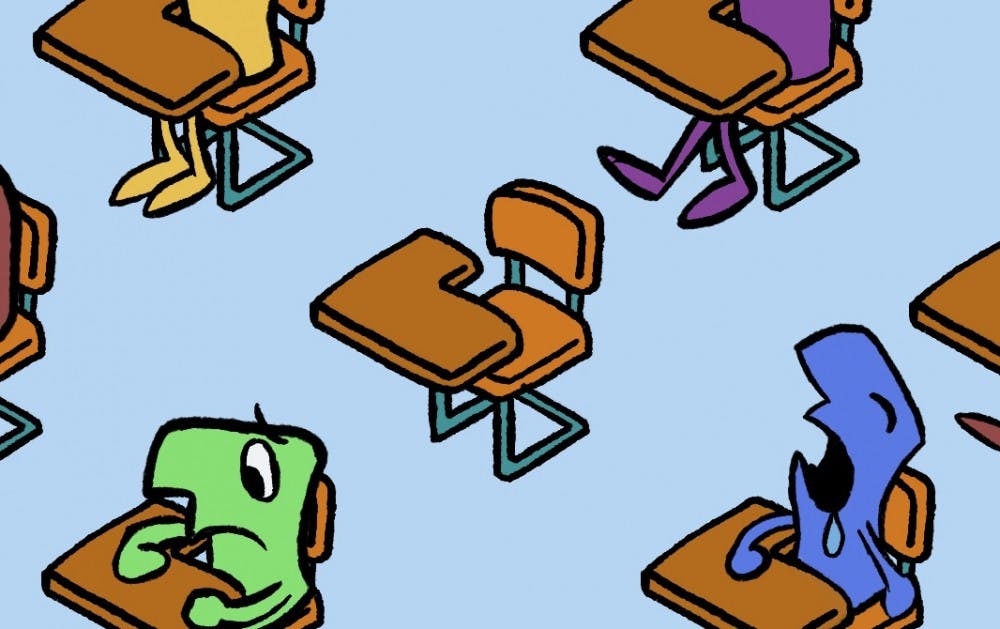At ASU, it is common for a chorus of sniffling to fill classrooms, especially during flu season.
According to the Centers for Disease Control and Prevention, students should stay home from school when sick in order to avoid spreading the illness — however, this is easier said than done at ASU.
For some classes, ASU absence policies are unforgiving and fail to promote campus health as they encourage students to go to class while sick and place their peers at risk.
There's no university-wide absence policy, and the policy subject to change from to department to department.
Sherman Dorn, the director of the division of educational leadership and innovation at ASU, said attendance policies are established for educational purposes.
“Attendance policies are ideally geared to help students learn,” Dorn said. “The relevant question that I think when a student looks at an attendance policy for a particular course is to ask, ‘okay, what are the pedagogical purposes behind this, and what am I getting out of this class for attending it?’ If it’s a face-to-face class, it’s really hard to learn if you’re not there.”
Depending on what classes students take, they may find themselves in classes with strict absence policies which prevent them from missing too many classes a semester.
For example, it is common for Human Event courses, which are offered by Barrett, the Honors College, to only allow two absences before students begin receiving grade penalties — if they miss more, they may be dropped from the course altogether.
Other departments, such as English, can allow up to two week's worth of absences, but often with caveats, such as tardiness counting as a full absence and missed workshop classes counting for more than one absence each.
While absence policies are meant to hold students accountable, they can place additional stress on students to attend class even when they are ill.
According to the University, 36.4 percent of ASU students reportedly felt that academic responsibilities had a high effect on their stress levels in the the 2014-15 academic year. Adding missed classes and potential withdrawal from courses to the already long list of students’ academic responsibilities may only serve to increase that stress.
It often does not matter whether absences are excused or unexcused. This means that even with a doctor's note, students can still receive grade penalties for missing class when they fall sick.
“I don’t usually want to try to micromanage students and why students are absent,” Dorn said. “If you’re sick, and it’s with the flu, I want you to stay home, and unless you need urgent hospitalization, it doesn’t matter for my purposes whether or not you see the doctor.”
However, introducing a “sick day” policy for students to mimic the professional world may not be the most efficient compromise between health and accountability in college.
“If the instructors felt like part of their job for large classes was to not only keep track of how well students were doing in the course, but also which absences are excused and which absences aren’t, that’s probably not a good use of instructor time,” Dorn said.
Instructors and department directors at ASU should keep in mind the well-being of students and provide more leniency in absences for students, especially if they have a valid reason for missing and are proactive about finding a solution.
For students battling a chronic illness that causes them to miss substantial class time, it is important to consider the different avenues affecting their continued success and enrollment in classes that semester.
“If you’re healthy, you should go to class,” Dorn said. “If you are ill, you probably shouldn’t. And if you are ill for more than 24 to 36 hours, you probably — if you’re a fully residential student — should check in with student health services, may want to check with a doctor, and may want to let your adviser know so that they can let you know what your options are if you may need to withdraw from a course.”
Reach the columnist at kalbal@asu.edu or follow @KarishmaAlbal on Twitter.
Editor’s note: The opinions presented in this column are the author’s and do not imply any endorsement from The State Press or its editors.
Want to join the conversation? Send an email to opiniondesk.statepress@gmail.com. Keep letters under 500 words and be sure to include your university affiliation. Anonymity will not be granted.
Like The State Press on Facebook and follow @statepress on Twitter.




